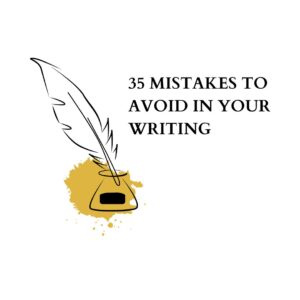35 Mistakes to Avoid in Your Writing
Writing is an art that requires practice, patience, and a keen eye for detail. Whether you are crafting a novel, writing an academic paper, or creating content for your blog, avoiding common mistakes can significantly enhance the quality of your work. This guide will outline 35 mistakes writers often make and provide tips on how to avoid them, ensuring your writing is clear, engaging, and professional.

Table of Contents
Introduction
Writing effectively is not just about having great ideas; it’s also about presenting those ideas clearly and correctly. Many writers—both novice and experienced—fall into traps that can undermine their work’s impact. By identifying and addressing these common mistakes, you can improve your writing skills and produce content that resonates with your audience.
Common Grammar Mistakes
Subject-Verb Agreement Errors
Ensure that subjects and verbs agree in number (singular/plural). For example:
- Incorrect: “The group of students are going on a trip.”
- Correct: “The group of students is going on a trip.”
Misplaced Modifiers
Modifiers should be placed next to the words they describe to avoid confusion.
- Incorrect: “She almost drove her kids to school every day.”
- Correct: “She drove her kids to school almost every day.”
Dangling Modifiers
Ensure that modifiers clearly refer to the correct subject.
- Incorrect: “After reading the book, the movie was disappointing.”
- Correct: “After reading the book, I found the movie disappointing.”
Inconsistent Verb Tense
Maintain consistent verb tense throughout your writing.
- Incorrect: “I walked to the store and buy some groceries.”
- Correct: “I walked to the store and bought some groceries.”
Pronoun Errors
Make sure pronouns clearly refer back to the nouns they replace.
- Incorrect: “When Sarah spoke to Jane, she was upset.”
- Correct: “When Sarah spoke to Jane, Jane was upset.”
Punctuation Errors
Comma Misuse
Commas are essential for clarity but can confuse readers if misused.
- Incorrect: “Let’s eat Grandma!”
- Correct: “Let’s eat, Grandma!”
Overusing Exclamation Points
Exclamation points can dilute their impact if overused.
- Instead of using multiple exclamations, choose one strong statement.
Semicolon Confusion
Use semicolons to connect closely related independent clauses.
- Incorrect: “I like coffee; and tea.”
- Correct: “I like coffee; I also like tea.”
Apostrophe Misuse
Apostrophes indicate possession or contractions but should not be used for plurals.
- Incorrect: “The cat’s are playing outside.”
- Correct: “The cats are playing outside.”
Quotation Marks Misuse
Use quotation marks correctly for direct quotes and titles of short works.
- Incorrect: I read an article called “The Future of AI”.
- Correct: I read an article called “The Future of AI.”
Structural Issues
Run-On Sentences
Run-on sentences can confuse readers; break them into shorter sentences.
- Incorrect: “I love writing it helps me express my thoughts.”
- Correct: “I love writing. It helps me express my thoughts.”
Sentence Fragments
Ensure each sentence has a subject and a verb.
- Incorrect: “Because I was late.”
- Correct: “I was late because I missed the bus.”
Lack of Paragraph Structure
Each paragraph should contain a clear main idea supported by details.
- Use topic sentences to introduce the main idea of each paragraph.
Poor Transitions Between Ideas
Use transitional phrases to guide readers through your arguments or narratives.
- Instead of abruptly changing topics, use phrases like “In addition” or “Conversely.”
Vague References
Be specific about what you are referring to in your writing.
- Instead of saying “this,” specify what “this” refers to.
Style and Clarity Problems
Overly Complex Sentences
Avoid convoluted sentences that may confuse readers.
- Simplify complex ideas into clearer statements.
Passive Voice Overuse
While passive voice isn’t incorrect, active voice often makes writing stronger.
- Passive: “The book was read by me.”
- Active: “I read the book.”
Redundant Phrases
Eliminate unnecessary words that do not add value.
- Instead of saying “each and every,” simply say “each” or “every.”
Clichés and Overused Expressions
Avoid clichés that can make your writing feel unoriginal.
- Instead of saying “time will tell,” consider a more unique expression.
Inconsistent Tone or Style
Maintain a consistent tone throughout your piece based on your audience and purpose.
Content-Specific Mistakes
Failing to Cite Sources Properly
Always give credit where it’s due; failing to cite sources can lead to plagiarism accusations.
Ignoring Audience Needs
Understand who your audience is and tailor your content accordingly.
Lack of Focus on Main Ideas
Stay on topic; avoid straying too far from your main argument or narrative.
Not Using Headings or Subheadings
Break up text with headings to improve readability and organization.
Skipping Outlines
Create an outline before you start writing to organize your thoughts logically.
Formatting Errors
Inconsistent Formatting
Ensure that font sizes, styles, and spacing are consistent throughout your document.
Ignoring Document Guidelines
Follow any specific formatting guidelines provided (e.g., APA, MLA) if applicable.
Not Using Bullet Points or Lists
Use bullet points or numbered lists for clarity when presenting information in a series.
Frequently Asked Questions (FAQs)
1. Why is it important to avoid mistakes in writing?
Avoiding mistakes in writing is crucial because errors can undermine your credibility, confuse your readers, and distract from your message. Clear and polished writing enhances communication and ensures that your ideas are conveyed effectively.
2. What are some common grammar mistakes to watch out for?
Common grammar mistakes include:
- Subject-verb agreement errors
- Misplaced or dangling modifiers
- Inconsistent verb tense
- Pronoun errors
3. How can I improve my punctuation skills?
To improve punctuation skills:
- Familiarize yourself with punctuation rules through grammar guides or online resources.
- Practice using punctuation in different contexts.
- Read your writing aloud to hear where punctuation might be needed for clarity.
4. What should I do if I struggle with sentence structure?
If you struggle with sentence structure:
- Break complex sentences into shorter, clearer ones.
- Use outlines to organize your thoughts before writing.
- Read examples of well-structured sentences to understand how they flow.
5. How can I ensure clarity and conciseness in my writing?
To ensure clarity and conciseness:
- Eliminate unnecessary words and redundancies.
- Use simple language and straightforward sentence structures.
- Focus on one main idea per paragraph.
6. Are there specific tools I can use to check my writing for errors?
Yes, several tools can help check your writing for errors, including:
- Grammarly: Offers grammar and style suggestions.
- Hemingway Editor: Highlights complex sentences and readability issues.
- ProWritingAid: Provides comprehensive reports on various aspects of your writing.
7. What are some tips for avoiding content-specific mistakes?
To avoid content-specific mistakes:
- Research thoroughly to ensure accuracy.
- Understand your audience and tailor your content to their needs.
- Stay focused on your main ideas without straying off-topic.
8. How important is proofreading and editing in the writing process?
Proofreading and editing are essential steps in the writing process as they help identify and correct errors, improve clarity, and enhance the overall quality of the text. Taking the time to revise can significantly impact how your writing is perceived.
9. Can reading more help me avoid mistakes in my own writing?
Yes, reading widely exposes you to different styles, vocabulary, and structures, which can improve your understanding of effective writing techniques. It also helps you recognize common mistakes that you may want to avoid in your own work.
10. What should I do if I receive negative feedback about my writing?
If you receive negative feedback:
- Take a moment to process the feedback without getting defensive.
- Look for constructive criticism that can help you improve.
- Use the feedback as an opportunity for growth and make revisions where necessary.
Conclusion
Writing is a skill that improves with practice and awareness of common pitfalls. By recognizing these 35 mistakes—from grammar issues to structural errors—you can enhance the quality of your writing significantly. Remember that effective writing is not just about avoiding mistakes; it’s also about engaging your audience with clear, compelling content that reflects your unique voice as a writer! Start implementing these best practices today, and watch as your writing transforms into a more polished and professional form!
Discover marketing services, interviews & publishing tools at SharingStories.




